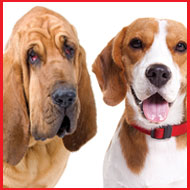Selective breeding has shaped dogs’ brains - study

Humans have been breeding dogs for centuries to carry out different tasks.
Breeding dogs for specific behavioural traits, such as hunting or companionship, has significantly altered the structure of their brains, according to new research.
Humans have been breeding dogs for centuries to carry out different tasks. Scientists believe these behavioural differences must be due to underlying neural differences, but until now the subject has gone largely unexplored.
The study led by Dr Erin Hecht of Harvard University examined whether and how selective breeding has altered the overall organisation of the dogs’ brain. Researchers examined regional volumetric variation in MRI scans of 62 male and female dogs of 33 different breeds.
They found that neuroanatomical variation is not simply driven by body size, brain size or skull shape, and is focused on specific networks of regions of the dogs’ brain.
Furthermore, a phylogenetic analysis (the means of estimating evolutionary relationships) revealed that most change has occurred in the terminal branches of the dog phylogenetic tree, suggesting strong, recent selection in individual breeds.
"These results indicate that through selective breeding, humans have significantly altered the brains of different lineages of domestic dogs in different ways,” the authors write.
"Finally, on a philosophical level, these results tell us something fundamental about our own place in the larger animal kingdom - we have been systematically shaping the brains of another species."
The study, Significant neuroanatomical variation among domestic dog breeds, is published in the Journal of Neuroscience.



 The Animal and Plant Health Agency (APHA) has updated its online reporting service for dead wild birds.
The Animal and Plant Health Agency (APHA) has updated its online reporting service for dead wild birds.